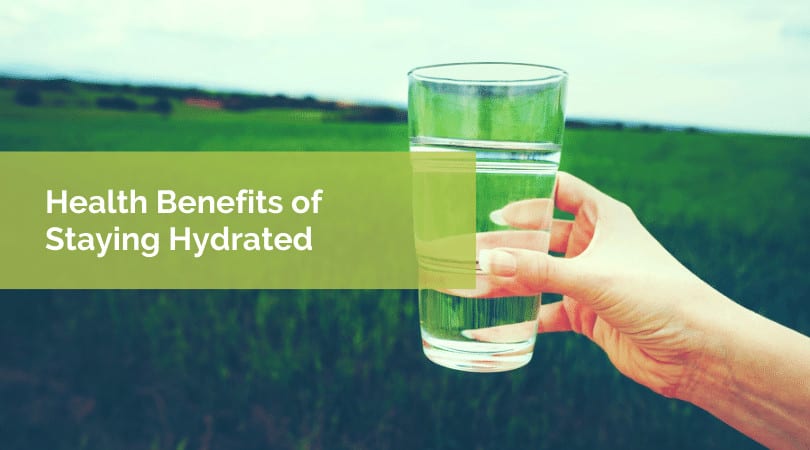
Water is the most critical nutrient in the body. After all, our bodies are around 60% water. Drinking enough water to stay hydrated is incredibly important for your physical health.
How Much Water Do You Need?
You may have heard the common recommendation to drink eight 8-ounce glasses of water per day. Or that you should drink the equivalent of your body weight in ounces of water. But, neither of these recommendations is completely true.
There is a Recommended Dietary Allowance for fluid, but this should be seen as more of an average recommended intake, which can vary a lot based on individual factors. The recommendation is:
- 7 liters, 125 ounces, or 15.5 cups per day for men
- 8 liters, 91 ounces, or 11 cups per day for women
These numbers are for “total fluid” and should include all the fluid you get from food as well.
There are many variables that can influence your hydration levels and how much water you need to drink. The amount you need can depend on:
- Weather
- How much you sweat
- Physical activity
- Amount of fruits and vegetables you consume
- Illness, such as fever
As you can see, all these variables make it difficult to determine how much water you need to drink regularly. A good place to start is to aim to consume the recommended amount for your body per day, then add more if you are still feeling thirsty.
Health Benefits of Hydration
Drinking enough water can help you improve your health. Here are a few of the benefits of being hydrated:
- Helps the body flush toxins and waste. The kidneys and digestive system need water to move waste out of the body.
- Improves physical performance. Losing as little as 2% of your body water can decrease physical performance and increase fatigue and oxidative stress caused by exercise.
- Supports brain function. Losing just 1-3% of your body water can impair brain function, influencing mood and impairing concentration and memory.
- Promotes healthy digestive function. A major benefit of being hydrated is that it helps prevent constipation, which can be quite uncomfortable.
- Helps keep kidneys healthy. Staying hydrated can help decrease the risk of kidney stones, painful clumps of minerals that can form in the urinary tract.
- May help with weight loss. Drinking enough water can increase metabolism by up to 30% and help you stay more satisfied throughout the day, so you eat less.
- Helps joints stay healthy. The cartilage between the joints is about 80% water, therefore chronic dehydration can lead to joint pain.
- Keeps skin healthy. Dehydration can lead to premature skin wrinkling and dryness; a benefit of hydration is beautiful skin.
These are just a few of the health benefits of hydration, as you can see water is extremely important to your well-being.
Tips to Drink More Water
Now that you know some of the benefits of hydration, how can you start drinking more water? Sure, plain water can be a bit boring and sometimes you get busy and forget. So, if you want to jazz it up a bit and hit your hydration goals, here are a few tips:
- Add fruit. Sliced strawberries or lemons can help add a little flavor to your water, making it feel even more refreshing
- Infuse other flavors. Consider adding mint, cucumber or other herbs to your water to give it a bit of flavor.
- Set a daily goal for you water intake. Make sure your goal is attainable. For example, if you only drink one cup a day, aim to increase it to two or three.
- Carry a water bottle with you. This may seem simple, but you cannot drink water if you don’t have any around. Invest in a reusable water bottle and carry it wherever you go.
When you make it a goal to drink enough water, you will quickly start to feel the health benefits of hydration, and your skin, digestion and kidneys will thank you.
References
- Boschmann M, Steiniger J, Hille U, et al. Water-induced thermogenesis. J Clin Endocrinol Metab. 2003;88(12):6015-6019.
- Bao Y, Wei Q. Water for preventing urinary stones. Cochrane Database Syst Rev. 2012;(6):CD004292.
- Robson KM, Kiely DK, Lembo T. Development of constipation in nursing home residents. Dis Colon Rectum. 2000;43(7):940-943.
- Armstrong LE, Ganio MS, Casa DJ, et al. Mild dehydration affects mood in healthy young women. J Nutr. 2012;142(2):382-388.
- Murray B. Hydration and physical performance. J Am Coll Nutr. 2007;26(5 Suppl):542S – 548S.
- Persistent Tiredness and Chronic Fatigue: Causes and Symptoms - February 27, 2024
- Can A Protein Shake Replace A Breakfast Meal? - March 2, 2023
- Glutamine After Surgery: Does It Help With Recovery? - February 17, 2023





